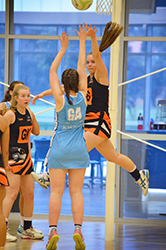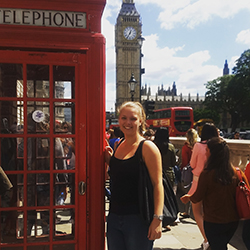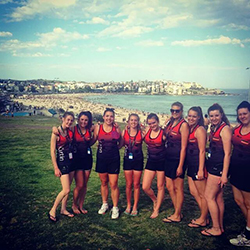This national diabetes week we want to raise awareness of the importance of taking the time to get checked for type 1 and 2 diabetes.
Bec, an Assistant Manager from our Perth Tax team shares her personal story with type 1 diabetes, the importance of prompt diagnosis and her ongoing management.
Diagnosis
In March 2011, I was 15 when I was diagnosed with type 1 diabetes. During the summer of 2011, I was finding that I was drinking a lot of water and going to the toilet a lot while I was working at Red Dot, my casual job. I was unpacking stock in the storeroom and it was hot, so my excuse for not recognising this as a symptom of diabetes, was that it was summer and it was hot (sweating more), therefore I was drinking more water and going to the toilet more…..logical.
I was also waking up during the night with cramps in my calves. My mum said that she would get similar cramps as a teenager, so we just ignored it and again, didn't see this as a symptom.
Following the summer break, I went back to school and took part in Country Week netball trials. Still showing all the other symptoms, I got to the first day of tryouts, did the warm-up and one drill, and wanted to vomit. So, I went home and slept for the rest of the day. I returned the next day for the second round of trials and again, I started the warm-up and felt like I was going to vomit or pass out. It was then that my phys ed teacher pulled me aside and asked if I thought I had diabetes. Of course, I said no way, but his wife has type 1 diabetes and he said I should go see the doctor. My mum picked me up and said “you’re going to have to get a blood test!” (I hate blood tests). Initially, she thought I was putting it on (a typical teenager trying to get out of school).
I had a blood prick test and urine test to determine my diagnosis and the doctor confirmed that I had type 1 diabetes. Based on my results, the doctor turned to my mum and said: “you need to take her to PMH now, not tomorrow, now”. My initial reaction was to just cry and cry, as the first thing I thought about was that I would now have to give myself needles.
At the time I was living in Bunbury, so my mum and I drove to Princess Margaret Hospital (PMH), where I spent the night in the ICU on an insulin pump. I was lucky to have been diagnosed when I was as the doctors had said that 24 more hours and I could have been dead. I had lost 8 kg, losing 3kg in just two days. It was incredible that I had minor symptoms for so long and then got really sick very quickly.
If I had picked up the minor symptoms like drinking more water, going to the toilet more and being lethargic, I may not have been as sick. However, as I was the first one in my family to ever have type 1 diabetes, and the symptoms were explainable by other reasons, we didn’t worry about them.
Education in PMH
After my diagnosis, I spent a week in the hospital recovering with my mum by my side while we learned everything we needed to know about type 1 diabetes. There was a lot to learn including what type 1 diabetes is, how it is affecting my body, how to administer insulin, and diet including nutritional values in foods. Having to deal with the diagnosis in the first place and trying to pay attention to the information that was being thrown at me was a lot, but education is really important. I think the thing I was most upset about (and even cried) was that I thought I would never be able to have Nutella again!
Adjusting to life
Food
Before I knew I had diabetes, I would have things such as muffin bars, chips, and cookies as snacks in my lunch box. However, I was taught at PMH that I now needed to change to foods that had less than 10g of fat and less than 20g of sugar per 100g. Foods that became commonplace included pretzels and muesli bars that fitted within the thresholds. In the beginning, there was definitely a strong adjustment with food and I was very strict with myself. However, now I just have everything in moderation and adjust my insulin for what I eat. An important skill to have as a type 1 diabetic is to determine the carbohydrate content of all the food you are eating, as this will determine how much insulin you require. I have recently been experimenting with a low carb diet, as it does wonders to the blood sugar levels, but I have decided just to maintain a normal diet and choose low carb options where I can.
Exercise
The timing of meals around exercise, the intensity of the exercise, the duration of the exercise, and the time of day of the exercise all have different impacts on blood sugar levels and have different insulin requirements to ensure that my blood sugars do not go too low or shoot through the roof.
At the start, it comes down to experimenting with it a little bit until you understand how your body reacts, then adjusting based on what your body does. Type 1 diabetes has not stopped me from doing any type of exercise. I danced until I left home to go to Uni and am still heavily involved in netball and going to the gym. The technology that has come out recently, such as the Libre Continuous Glucose Monitoring (CGM) system, really helps in monitoring your sugars while you are exercising as well.
TravelLing
 Apart from having to carry all your diabetes stuff around with you, diabetes has not stopped me from travelling. I have been over to America, Europe, Singapore, and interstate. Staff at the airport are aware that type 1 diabetics need all their equipment with them in their hand luggage so it’s not a big deal.
Apart from having to carry all your diabetes stuff around with you, diabetes has not stopped me from travelling. I have been over to America, Europe, Singapore, and interstate. Staff at the airport are aware that type 1 diabetics need all their equipment with them in their hand luggage so it’s not a big deal.
Day to Day
In terms of injections, I’m required to have insulin every time I eat carbohydrates and whenever my blood sugar is not within the correct levels. So, injections can range from just 6 a day to 12 a day depending on what I am eating. I have to make sure that all my diabetes supplies are stocked before I leave the house. I monitor my blood sugars throughout the day just to make sure they are tracking ok.
Education to Others and Community
 There is a whole community in Perth with people with type 1 diabetes and it’s great. We have had social events, get-togethers and education seminars. I also like to talk to other people not so familiar with type 1 diabetes about the disease to spread awareness of the symptoms.
There is a whole community in Perth with people with type 1 diabetes and it’s great. We have had social events, get-togethers and education seminars. I also like to talk to other people not so familiar with type 1 diabetes about the disease to spread awareness of the symptoms.
My family and friends have been my biggest supporters, especially my mum. Through the education at PMH, to getting up to do the blood checks in the middle of the night, to all the type 1 diabetes appointments, she has been there for me the whole time and I wouldn’t be able to get through it without her.
There is a lot to think about day after day and managing life with type 1 diabetes definitely comes with its challenges. We all have our good and bad days and no one is ever perfect with their management of diabetes. It can be stressful balancing work, family, social life plus throwing managing diabetes in the mix but I don’t let it hold me back from doing the things I want to do. In life sometimes we get handed bad cards, we just have to play them the best we can.
Bec's story: 2021 Update
How has the lockdowns/COVID-19 impacted the awareness for Diabetes?
One of the interesting things to come out of the COVID-19 pandemic and the lockdowns was the decrease in the number of people being diagnosed with diabetes. Speaking to one of the staff members of the Type 1 Diabetes Family Centre at a dinner catch up earlier this year I found out that the number of kids diagnosed with type 1 diabetes at the children’s hospital went from at least 1 a day pre-COVID, to maybe 1 every 3 days. There was concern that due to the lockdowns and the anxiety around COVID-19 people were not seeking medical attention if they were unwell and experiencing common symptoms of diabetes.
This was quite concerning for me personally as I remember my diagnosis and how unwell I got because I did not recognise the early warning signs and seek medical attention. I would stress to anyone that even with the risk of COVID-19 in the community, always seek medical attention if you are experiencing symptoms that you are not used to (i.e. drinking more water, going to the toilet more, muscle cramps, dry mouth, etc.).
Has there been any impact on mental health for people with Diabetes in the last 12 months?
COVID-19 was a big spanner in the works for most people in the world, especially for all diabetics. When people with diabetes could potentially be classed as “moderate-risk” of not surviving COVID-19 if diagnosed, there was definitely an increase in the anxiety levels across the diabetic community.
Again, the Type 1 Diabetes Family Centre adults’ online community was amazing in organising online coffee catch ups which gave adults with diabetes an opportunity to connect and touch base with other members of the community. However, I could imagine that newly diagnosed diabetics may have felt alone and isolated coming to terms with their diagnosis as a result of the COVID-19 lockdowns.
For myself personally, I ensured that I continued to make time for exercise, whether that be a run in the morning or a workout in the afternoon, to clear the mind. I was lucky enough that I could work from home and maintain a somewhat normal routine, which definitely kept the anxiety levels down whilst maintaining my type 1 diabetes.
Nearly 50 percent of people with diabetes have experienced mental health challenges in the last 12 months and this National Diabetes Week, we are reminded of the importance of being thoughtful and aware of the words we use and the actions we take with family, friends, and colleagues who have diabetes. - www.diabetesaustralia.com.au/national-diabetes-week/

